Gå offline med appen Player FM !
205 — Three Gun Champion Jack Copeland
Manage episode 361823993 series 1539957
It’s podcast time again, and this month Gun Mag Warehouse’s Jeremy Stone sits down with 2-time National Three-Gun Champion Jack Copeland. The podcasts are always fun and informative, and this one is no different. Jeremy and Jack talk about much more than Three-Gun in their hour together. Here’s a brief rundown of their conversation to prime you for the podcast itself. But make certain you give it a listen. These are just the high points.
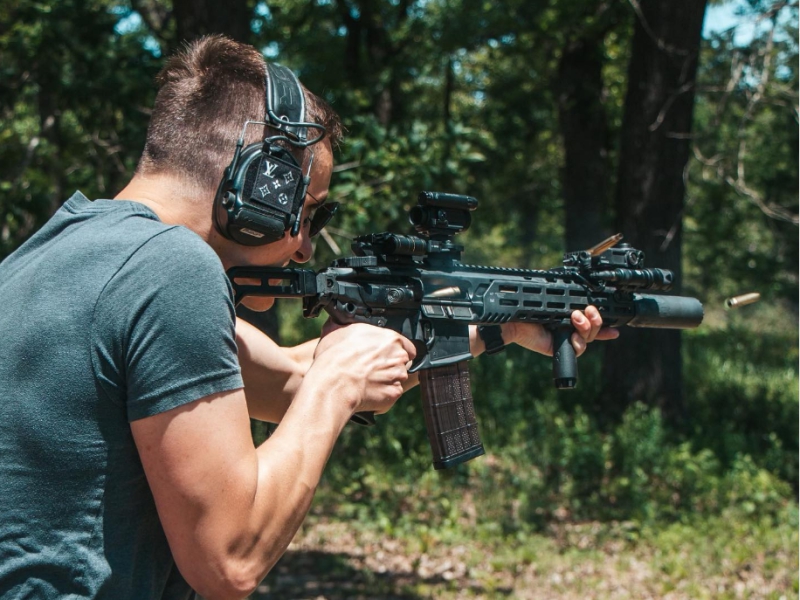
Olympic Gold Medals and National Championships
Jack shot his first competitive match at age 14, which, not-so-coincidentally, was the same age he started training with 5-time Olympic Gold Medalist shooter John McNally. Jack has always loved guns and shooting. He had just bought a Glock 17 at a gun show and stopped by McNally’s booth to look at the latter’s upgraded Glock trigger. It came out that McNally offered training and Jack’s Dad made it happen. So, they shot 1,000 rounds every weekend for a year. Awesome parenting, right there, Mr. Copeland.
Jack has competed in many categories, and even joined the US Modified Team at the 2018 Shotgun World Championships in Paris. That’s Paris, France, not Paris, Texas, in case you’re wondering, though the Lone Star version is a nice little town. Jack performed very well, placing 80th in a field of 700, despite getting a “zero” on one stage thanks to an ill-timed squib load. Jack also shot with the Russians and Ukrainians in Paris, and he has some interesting comments on that.
Jack’s favorite category, though, is Three-Gun. He says it’s more exciting. “I want to run through a course of fire and have my rifle slung behind me, and my pistol, and carrying my shotgun.” Jeremy, as a newer competitor, acknowledged Jack’s preference, but also notes how he likes the simplicity and structured setup of Steel Challenge matches.
A Welcoming Community
Jack allows that shooting Three-Gun can be scary at first, but he emphasizes how nice the entire community is, especially compared to what he calls “purist” competition circuits. Not that those circles are complete snobs, but the vibe is different. Jack relates how another competitor once loaned him an $8,000 pistol to shoot a stage when his Glock wouldn’t cycle his reloaded ammo.
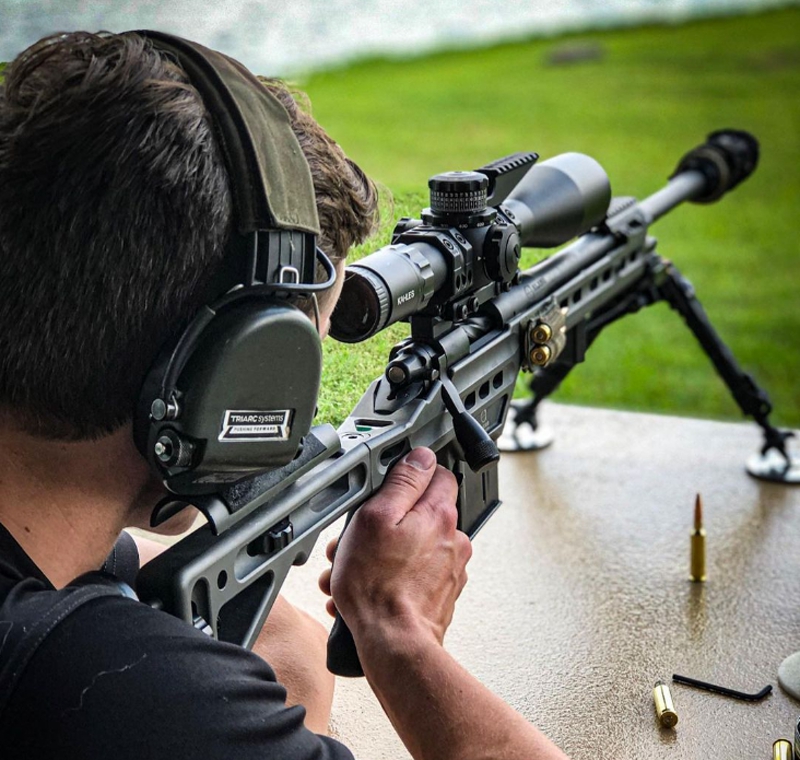
Jeremy agreed that competitive shooters are very welcoming, citing his first Precision Rifle match, where he says most everyone was excited by his interest in their sport. Similar to Jack’s experience, another shooter offered to let Jeremy use his rifle. Great stuff.
Jeremy also talks about the obstacles to entering the sport, saying they are almost always self-inflicted. But that same PRS shooter told him that “There’s always a reason not to start. You can always come up with something that’s gonna stop you. But if you come out here and shoot, people will lend a hand.”
Now that he’s established, Jack says he’s very selective about the matches he shoots. He particularly likes Jerry Miculek’s Three-Gun match. He mentions several reasons why, but a big one is that “It’s a great group of people.”
Jack says he wishes professional shooting paid better (don’t we all). Jeremy notes that most shooters pay for their own gear and equipment, though some stuff is discounted. “They’re not just handing out rifles to guys who want to shoot,” he says. “Ask me how I know.”
The Importance of Quality Training
This part of the podcast kicks off when Jeremy says the time and expense of training also keeps people from entering competitive shooting. “But starting and moving somewhere is better than doing nothing.” Jack agrees, saying he believes in training, even if it’s just a small local course. Do what you can and build from there.
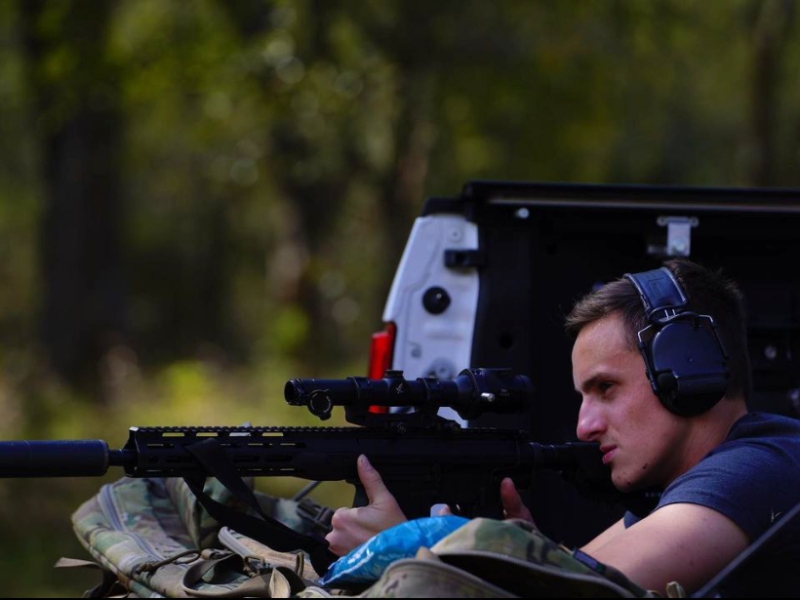
Jack talks about how he’s worked for several companies, but he always teaches fundamental shooting skills. If you find a course teaching good fundamentals, it’s worth your while. Higher level course, Jeremy notes, are mostly fundamentals, but “fundamentals fast.” Jack agrees, but he adds a caveat. High level courses do teach fundamentals, but those instructors have shot so much that they have “learned the little tips and tricks that speed you up and…the secrets and…the ways to do it. That’s what you pay for.”
Jack also says that he doesn’t try to teach tactical courses. He leaves that to guys who have done it for real. He takes those classes himself. J & J then have a good discussion about equipment and how people often buy things they don’t need, mainly because they don’t know any better.
Jack calls this trend the “poor man’s tax,” which can be avoided by investing in quality training early on. Jeremy shares how he was advised not to buy anything before taking a class. The class would show him what he needed and how certain things worked, or didn’t work, for other students. Jeremy attributes much of people wasting their money on the fact that the average AR-15 owner only shoots about 100 rounds per year. They just don’t shoot enough to learn any better.
They also discuss the difficulties of being a left-handed shooter, which Jeremy is. He has left-handed firearms but he purposely trains with right-handed weapons so he can, theoretically, pick up any gun and be at least somewhat proficient. Probably a good idea.
Automatic Weapons and the NFA
Jack talks about how machine guns are “a horrible drug. Very addicting.” He quickly moved from an M-4 to an MP5 to an MCX to a belt-fed. Now he wants a belt-fed .50 cal Ma Deuce. Sounds like fun to me! But thanks to current gun laws, private individuals pretty much have to be affiliated with a corporation to gain access to such firearms.
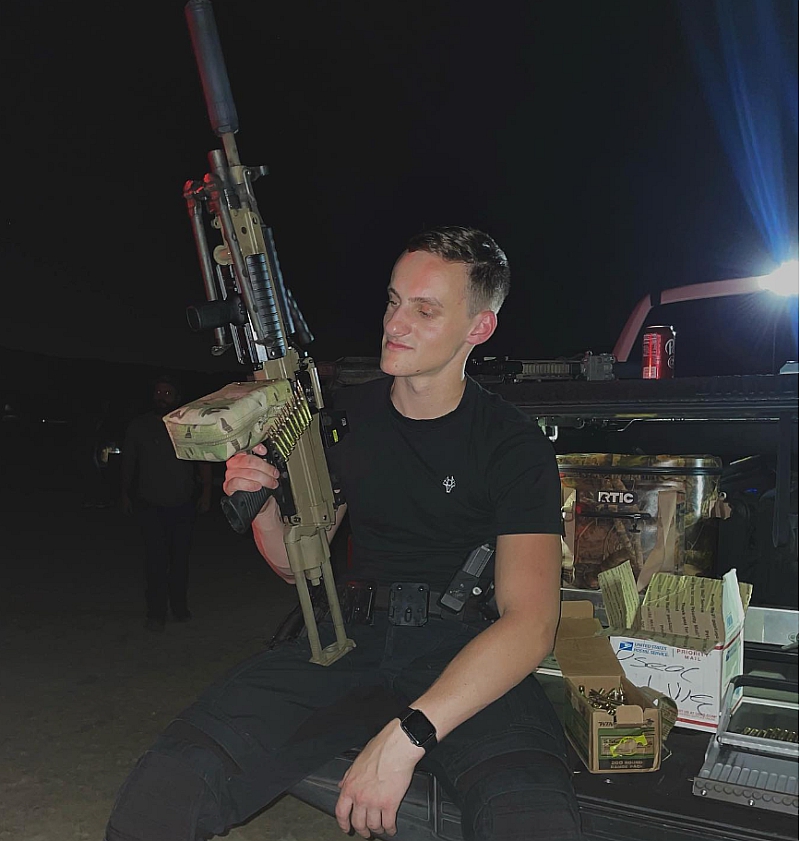
This leads to a discussion of how ill-conceived the NFA is, especially regarding suppressors and short-barreled rifles. Hollywood is rightly blamed for framing suppressors as whisper quiet assassins’ tools. Plus, is anyone really trying to conceal a 10-inch AR?
Jack points out that the ATF’s new pistol brace rule is tough on competitors. He relies on short 9mm AR pistols for his living. Is he supposed to Form 1 all of them as SBRs and hope it doesn’t take too long?
Odds and Ends
Jeremy rightly notes that their discussion was all over the place, but that’s what made it interesting. It was a free flow conversation instead of a structured interview. Here are some highlights of what else was discussed:
- The ridiculously long magazines and red anodized parts seen at competitions, and how none of that tops good fundamentals.
- How the difficulty of competing in tactical ops competitions improves real world skills.
- How the Tactical Games is like Cross Fit.
- How Jeremy’s priorities change when he’s shooting on camera. Pretty shocking, really. (Not really, but understandable).
- The difficulties of filming through night vision gear.
- How “the lingo,” as Jack calls it, affects training and sometimes makes shooting sports exclusionary, as does limited range access.
- The joys of events like Kalash Bash.
- Pro-gun vs. anti-gun perspectives, plus how certain Presidents and Covid drove guns sales. And how certain bad actors tried to profit from such things by price gouging. A certain retailer is called out by name.
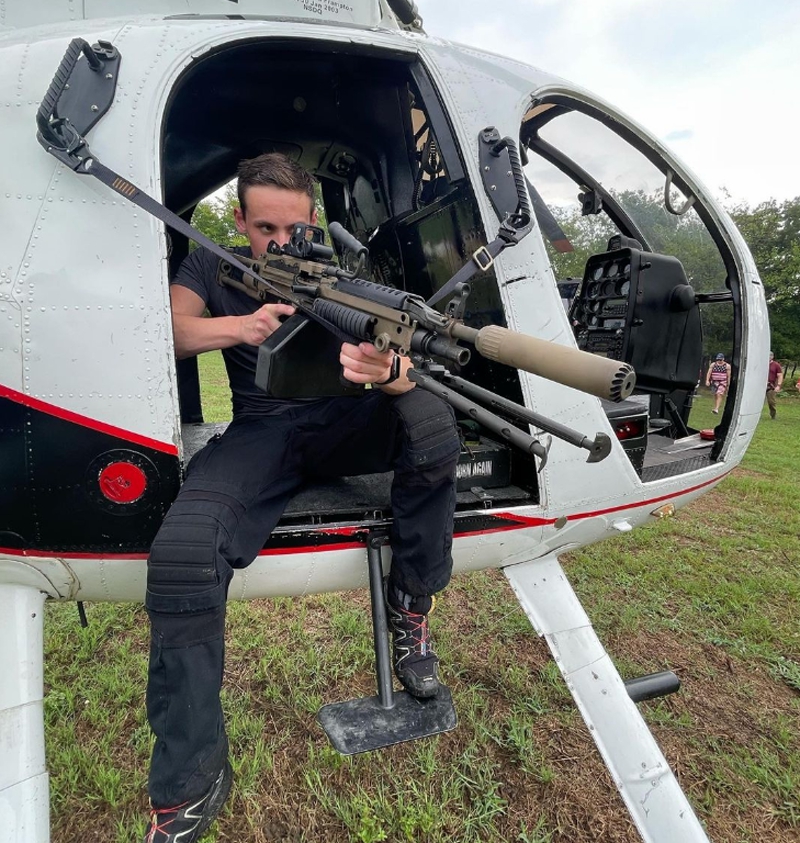
A Fun Discussion
I always enjoy these podcasts because of the free-flow form. This one engaged me from beginning to end. Just two friends talking about shooting guns. Shooting at a high level, mind you, but still just shooting guns. I liked that it was kind of all over the place. That’s when little nuggets come through, where they might not in a structured interview. Do yourself a favor and give it a listen.
https://media.blubrry.com/gunfightercast/content.blubrry.com/gunfightercast/joackcopelandpodcastaudio.mp3
60 episoder
Manage episode 361823993 series 1539957
It’s podcast time again, and this month Gun Mag Warehouse’s Jeremy Stone sits down with 2-time National Three-Gun Champion Jack Copeland. The podcasts are always fun and informative, and this one is no different. Jeremy and Jack talk about much more than Three-Gun in their hour together. Here’s a brief rundown of their conversation to prime you for the podcast itself. But make certain you give it a listen. These are just the high points.

Olympic Gold Medals and National Championships
Jack shot his first competitive match at age 14, which, not-so-coincidentally, was the same age he started training with 5-time Olympic Gold Medalist shooter John McNally. Jack has always loved guns and shooting. He had just bought a Glock 17 at a gun show and stopped by McNally’s booth to look at the latter’s upgraded Glock trigger. It came out that McNally offered training and Jack’s Dad made it happen. So, they shot 1,000 rounds every weekend for a year. Awesome parenting, right there, Mr. Copeland.
Jack has competed in many categories, and even joined the US Modified Team at the 2018 Shotgun World Championships in Paris. That’s Paris, France, not Paris, Texas, in case you’re wondering, though the Lone Star version is a nice little town. Jack performed very well, placing 80th in a field of 700, despite getting a “zero” on one stage thanks to an ill-timed squib load. Jack also shot with the Russians and Ukrainians in Paris, and he has some interesting comments on that.
Jack’s favorite category, though, is Three-Gun. He says it’s more exciting. “I want to run through a course of fire and have my rifle slung behind me, and my pistol, and carrying my shotgun.” Jeremy, as a newer competitor, acknowledged Jack’s preference, but also notes how he likes the simplicity and structured setup of Steel Challenge matches.
A Welcoming Community
Jack allows that shooting Three-Gun can be scary at first, but he emphasizes how nice the entire community is, especially compared to what he calls “purist” competition circuits. Not that those circles are complete snobs, but the vibe is different. Jack relates how another competitor once loaned him an $8,000 pistol to shoot a stage when his Glock wouldn’t cycle his reloaded ammo.

Jeremy agreed that competitive shooters are very welcoming, citing his first Precision Rifle match, where he says most everyone was excited by his interest in their sport. Similar to Jack’s experience, another shooter offered to let Jeremy use his rifle. Great stuff.
Jeremy also talks about the obstacles to entering the sport, saying they are almost always self-inflicted. But that same PRS shooter told him that “There’s always a reason not to start. You can always come up with something that’s gonna stop you. But if you come out here and shoot, people will lend a hand.”
Now that he’s established, Jack says he’s very selective about the matches he shoots. He particularly likes Jerry Miculek’s Three-Gun match. He mentions several reasons why, but a big one is that “It’s a great group of people.”
Jack says he wishes professional shooting paid better (don’t we all). Jeremy notes that most shooters pay for their own gear and equipment, though some stuff is discounted. “They’re not just handing out rifles to guys who want to shoot,” he says. “Ask me how I know.”
The Importance of Quality Training
This part of the podcast kicks off when Jeremy says the time and expense of training also keeps people from entering competitive shooting. “But starting and moving somewhere is better than doing nothing.” Jack agrees, saying he believes in training, even if it’s just a small local course. Do what you can and build from there.

Jack talks about how he’s worked for several companies, but he always teaches fundamental shooting skills. If you find a course teaching good fundamentals, it’s worth your while. Higher level course, Jeremy notes, are mostly fundamentals, but “fundamentals fast.” Jack agrees, but he adds a caveat. High level courses do teach fundamentals, but those instructors have shot so much that they have “learned the little tips and tricks that speed you up and…the secrets and…the ways to do it. That’s what you pay for.”
Jack also says that he doesn’t try to teach tactical courses. He leaves that to guys who have done it for real. He takes those classes himself. J & J then have a good discussion about equipment and how people often buy things they don’t need, mainly because they don’t know any better.
Jack calls this trend the “poor man’s tax,” which can be avoided by investing in quality training early on. Jeremy shares how he was advised not to buy anything before taking a class. The class would show him what he needed and how certain things worked, or didn’t work, for other students. Jeremy attributes much of people wasting their money on the fact that the average AR-15 owner only shoots about 100 rounds per year. They just don’t shoot enough to learn any better.
They also discuss the difficulties of being a left-handed shooter, which Jeremy is. He has left-handed firearms but he purposely trains with right-handed weapons so he can, theoretically, pick up any gun and be at least somewhat proficient. Probably a good idea.
Automatic Weapons and the NFA
Jack talks about how machine guns are “a horrible drug. Very addicting.” He quickly moved from an M-4 to an MP5 to an MCX to a belt-fed. Now he wants a belt-fed .50 cal Ma Deuce. Sounds like fun to me! But thanks to current gun laws, private individuals pretty much have to be affiliated with a corporation to gain access to such firearms.

This leads to a discussion of how ill-conceived the NFA is, especially regarding suppressors and short-barreled rifles. Hollywood is rightly blamed for framing suppressors as whisper quiet assassins’ tools. Plus, is anyone really trying to conceal a 10-inch AR?
Jack points out that the ATF’s new pistol brace rule is tough on competitors. He relies on short 9mm AR pistols for his living. Is he supposed to Form 1 all of them as SBRs and hope it doesn’t take too long?
Odds and Ends
Jeremy rightly notes that their discussion was all over the place, but that’s what made it interesting. It was a free flow conversation instead of a structured interview. Here are some highlights of what else was discussed:
- The ridiculously long magazines and red anodized parts seen at competitions, and how none of that tops good fundamentals.
- How the difficulty of competing in tactical ops competitions improves real world skills.
- How the Tactical Games is like Cross Fit.
- How Jeremy’s priorities change when he’s shooting on camera. Pretty shocking, really. (Not really, but understandable).
- The difficulties of filming through night vision gear.
- How “the lingo,” as Jack calls it, affects training and sometimes makes shooting sports exclusionary, as does limited range access.
- The joys of events like Kalash Bash.
- Pro-gun vs. anti-gun perspectives, plus how certain Presidents and Covid drove guns sales. And how certain bad actors tried to profit from such things by price gouging. A certain retailer is called out by name.

A Fun Discussion
I always enjoy these podcasts because of the free-flow form. This one engaged me from beginning to end. Just two friends talking about shooting guns. Shooting at a high level, mind you, but still just shooting guns. I liked that it was kind of all over the place. That’s when little nuggets come through, where they might not in a structured interview. Do yourself a favor and give it a listen.
https://media.blubrry.com/gunfightercast/content.blubrry.com/gunfightercast/joackcopelandpodcastaudio.mp3
60 episoder
Alle episoder
×Velkommen til Player FM!
Player FM is scanning the web for high-quality podcasts for you to enjoy right now. It's the best podcast app and works on Android, iPhone, and the web. Signup to sync subscriptions across devices.




